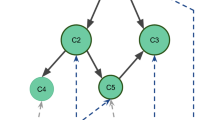Abstract
The main challenge of e-learning systems is to provide different courses to different students with different learning abilities. Such systems must also be efficient and adaptive. However, adaptivity can be accomplished by improving the ability to select dynamically an appropriate learning object for a specific learner. a framework for individualized learning object selection, called Eliminating and Optimizing Selection (EOS) was proposed by Liu and Greer (2004). In this paper, the EOS framework is further analyzed, implemented and experimented. As a result, a formalization for this framework has been suggested. The computational results of this approach have been compared to the selection results done by other specialists. Comparisons have shown its superiority in terms of producing more optimized selection of learning objects. Moreover, this approach has demonstrated its competitiveness in terms of the selected sequences of learning objects for different learners with different needs.







Similar content being viewed by others
References
Andreev, R. D., & Troyanova, N. V. (2006). “E-learning Design: An Integrated Agent-Grid Service Architecture”, IEEE John Vicent Atanasoff 2006 International Symposium on Modern Computing (JVA’06). pp. 208–213. IEEE Computer Society.
Brusilovsky, P., & Vassileva, J. (2003). Course sequencing techniques for large-scale web-based education. International Journal of Continuing Engineering Education and Life-long Learning, 13, 75–94.
Burgos, D., & Specht, M. (2006). “Adaptive e-Learning Methods and IMS Learning Design: An integrated approach”, Proceedings of the Sixth International Conference on Advanced Learning Technologies (ICALT’06). pp. 1192–1193. IEEE Computer Society.
Carchiolo, V., Longheu, A., & Malgeri, M. (2002). Adaptive Formative Paths in a Web-based Learning Environment. Educational Technology & Society, 5(4), 2002.
Henze, N., & Nejdl, W. (2003). “Logically Characterizing Adaptive Educational Hypermedia Systems”. Proceeding of the International Workshop of Adaptive Hypermedia and Adaptive Web-based Systems, pp. 15–28.
Honey, P., & Mumford A. (1992). “The manual of learning Styles”, Maidenhead: Peter Honey.
Karampiperis, P., & Sampson, D. (2004). “Adaptive Learning Object Selection in intelligent learning systems”. Journal of Interactive Learning Research, 15(4), 389–407.
Karampiperis, P., & Sampson, D. (2005). “Adaptive Learning Resources Sequencing in Educational Hypermedia Systems”. IFETS: International Forum of Educational Technology and Society, pp 128–147.
Liu, J., & Greer, J., (2004). “Individualized Selection of Learning Object”. Workshop on Applications of Semantic Web Technologies for e-Learning (SW-EL@ITS’04), 30 August-03 September, 2004, Maceió, Brazil.
Najjar, L. J. (1996). Multimedia Information and Learning. Journal of Educational Multimedia and Hypermedia, 5, 129–150.
Pythagoras, K., & Demetrios, S. (2004). “Using Ontologies for Adaptive Navigation Support in Educational Hypermedia Systems”. Proc. of the 3rd International Conference on Adaptive Hypermedia and Adaptive Web-based Systems, vol. 2, pp. 314–323, Eidhoven, Netherlands, TU/e Pub., August 2004.
Soine, R. (2001). “Instructional Design in a Technological World: Fitting Learning Activities into the Larger Picture”. Proceedings IEEE International Conference on Advanced learning technologies (ICALT’01). pp. 49–52. IEEE Computer Society.
Viet, A. N., & Si D. H. (2006). “ACGs: Adaptive Course Generation System — An Efficient Approach to Build e-Learning Course”. Proceeding of The Sixth IEEE International Confernce on Computer and Information Technology (CIT’06). pp. 259– 265. IEEE Computer Society.
Yanwen, W., & Zhonghong, W. (2004). “Knowledge Adaptive Presentation Strategy in E-learning”. Knowledge Economy Meets Science and Technology-KEST 2004.
Yu, D., Zhang, W., & Chen, X. (2006). “New Generation of e-Learning Technologies”. First International Multi-Symposiums on Computer and Computational Sciences, IMSCCS’06. pp. 455–459. IEEE Computer Society.
Author information
Authors and Affiliations
Corresponding author
Rights and permissions
About this article
Cite this article
Alian, M. Formalization and implementation of Eliminating and Optimizing Selection (EOS) approach. Educ Inf Technol 16, 89–103 (2011). https://doi.org/10.1007/s10639-009-9113-0
Published:
Issue Date:
DOI: https://doi.org/10.1007/s10639-009-9113-0




